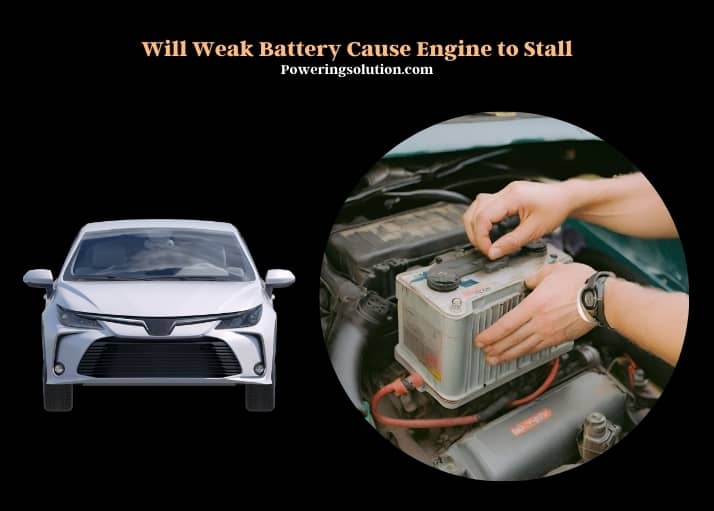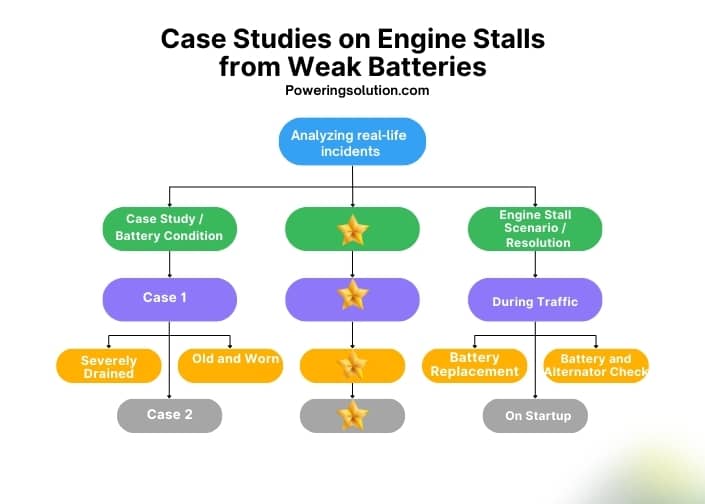A weak battery can indeed cause an engine to stall. This typically happens because the battery is unable to provide sufficient power to keep the engine running, especially when the vehicle is idling or under high electrical load.
The battery in a vehicle is crucial for starting the engine and powering electrical components when the engine is off. Its health directly impacts the engine’s performance. A weak or failing battery struggles to supply the necessary power, which can lead to difficulties in starting the engine or cause the engine to stall during operation. This is particularly evident in situations where the electrical demand is high, such as during the use of headlights, air conditioning, or the sound system.

Moreover, the battery’s condition affects the alternator’s performance. The alternator charges the battery while the engine runs; however, if the battery is weak, the alternator works harder, potentially leading to its premature failure. This additional strain can also impact the engine’s performance, contributing to stalling.
Regular maintenance and timely battery replacement are essential. A vehicle’s battery typically lasts between 3 to 5 years, but this lifespan can be shortened by factors like extreme temperatures, frequent short trips, and high electrical usage. Keeping an eye on the battery’s health and ensuring it is adequately charged can help prevent engine stalls and maintain the vehicle’s overall performance.
Impact of a Weak Battery on Engine Performance
The performance of an engine is intricately linked to the health of the car’s battery. A weak battery can significantly impair the engine’s functionality. The battery is the primary source of electrical power for a vehicle, not only for starting the engine but also for powering the electrical systems while the engine is off.
When the battery’s power diminishes, it struggles to meet the electrical demands of the car, including the ignition and fuel systems. This insufficiency can lead to difficulties in starting the engine or even cause the engine to stall during operation.
The role of the battery in engine functionality is critical; it provides the necessary power to the starter motor to turn the engine over and maintains the fuel system’s operation. A diminished battery can disrupt these processes, leading to poor engine performance or failure to start.
Recognizing Battery-Related Engine Stalls
Identifying engine stalls due to battery issues is essential for timely maintenance and repair. Engine stalling can occur for various reasons, but specific symptoms point to battery problems. These include dimming headlights, slow engine crank, and the check engine light.
Distinguishing between battery-related stalls and other causes is crucial for accurate diagnosis. For instance, a failing alternator can exhibit similar symptoms to a dying battery.
Diagnostic methods, such as voltage tests and load testing, are effective in assessing battery health and its impact on engine performance. Regular checks can preemptively identify potential problems, aiding in timely intervention and preventing engine stalls.
Battery-Induced Engine Stalls
The relationship between a car’s battery and its engine is fundamentally electrical. The engine requires a consistent electrical supply to function correctly. Low battery voltage can adversely affect various engine components. For instance, insufficient voltage can lead to inadequate fuel delivery or faulty ignition, causing the engine to stall.
The alternator plays a vital role in this system, charging the battery while the engine runs. If the battery is weak, the alternator may not be able to replenish it adequately, leading to a cycle of battery drain and engine stalls. Understanding this interplay is key to diagnosing and resolving engine issues related to battery health.
Maintaining Battery Health to Prevent Engine Stalls
Regular maintenance of the car’s battery is vital in preventing engine stalls. Guidelines for battery upkeep include ensuring clean and tight connections, avoiding extreme temperatures, and regular testing of battery health. Tips to extend battery life involve minimizing the use of accessories when the engine is off and keeping the battery charged.
Routine vehicle check-ups play a significant role in preserving both battery and engine health. These check-ups can identify potential issues before they escalate, ensuring the longevity of the battery and the reliability of the engine.
Case Studies on Engine Stalls from Weak Batteries
Analyzing real-life incidents of engine stalling due to weak batteries provides valuable insights. Documented cases show a range of conditions under which battery-related engine stalls occur. These studies highlight the importance of regular battery maintenance and early detection of issues.
A table summarizing key data from these case studies can illustrate the frequency and conditions of such incidents, offering lessons from real-world examples.

| Case Study | Battery Condition | Engine Stall Scenario | Resolution |
| Case 1 | Severely Drained | During Traffic | Battery Replacement |
| Case 2 | Old and Worn | On Startup | Battery and Alternator Check |
FAQs
Can a Weak Battery Affect Engine Idle?
A weak battery can indeed influence engine idle, although indirectly. The battery’s primary role is to power the electrical systems and start the engine. If it’s weak, the alternator works harder to compensate, potentially affecting the engine’s idle stability.
This is because the alternator, trying to charge a failing battery, places extra load on the engine. This additional load can cause irregularities in engine idle, especially noticeable in older vehicles. In modern cars with more sophisticated electrical systems, the effect might be less pronounced but still present.
Is It Safe to Drive with a Weak Battery?
Driving with a weak battery is risky. While the vehicle might still operate, the battery’s inability to hold a charge can lead to unexpected shutdowns, especially under high electrical demand. This risk is heightened during activities like stopping at a traffic light or slowing down at an intersection, where the alternator’s output is reduced, and the battery’s reserve is crucial.
Other essential systems like power steering and brakes, which rely on electrical power, might malfunction, compromising safety.
Does Weather Affect Battery-Induced Engine Stalls?
Weather conditions significantly impact a battery’s performance and, consequently, the likelihood of engine stalls. Extreme cold and hot temperatures can strain the battery. In cold weather, the battery’s capacity to hold a charge decreases, making it harder to start the engine and maintain its operation.
In contrast, extreme heat can accelerate battery fluid evaporation, leading to diminished battery life and increased risk of engine stalling. Regular battery maintenance is even more critical in areas with severe weather conditions.
Can Jump Starting Help with a Weak Battery?
Jump starting can temporarily assist a vehicle with a weak battery, allowing the engine to start and run. However, it’s a short-term solution. If the battery is old or damaged, it may not hold a charge for long, leading to repeated stalling or starting issues.
After jump starting, it’s advisable to drive the vehicle for an extended period to allow the alternator to charge the battery. Nevertheless, if the battery’s condition is poor, replacing it is often the most reliable solution.
What’s the Lifespan of a Car Battery?
The average lifespan of a car battery is about 3 to 5 years, but this can vary based on factors like climate, vehicle type, and usage patterns. Frequent short trips, for instance, can shorten a battery’s life because the alternator doesn’t have enough time to fully recharge the battery between starts.
Similarly, extreme temperatures, both hot and cold, can reduce a battery’s effective lifespan. Regular maintenance and check-ups can help maximize a battery’s lifespan.
Does the Electrical System Warn of Battery Issues?
Modern vehicles often have built-in electrical system warnings that alert the driver to battery issues. The most common indicator is the battery warning light on the dashboard, which can signal a weak battery or charging system problems.
Some vehicles also have advanced diagnostic systems that monitor battery health and alert the driver of potential issues before they lead to engine stalls. Regular vehicle check-ups can help identify battery issues early, even before dashboard indicators light up.
The health of a car’s battery is paramount in ensuring the smooth operation of the engine. Recognizing symptoms of battery-related issues, understanding the electrical dynamics between the battery and engine, and adhering to regular maintenance can significantly reduce the risk of engine stalls. Real-life case studies reinforce the importance of battery health in overall vehicle performance.
